Contact UsCONTACT
Please feel free to contact us if you have any questions or concerns.
Inquiry FormStories
STORIES
SERIES EMBARK
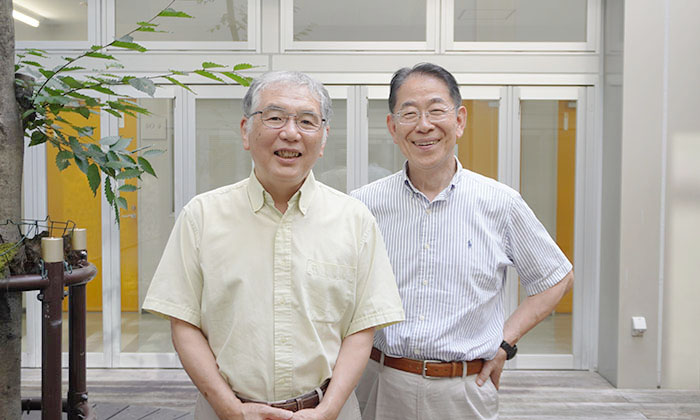
As natural marine resources are declining due to overfishing and global warming, the importance of aquaculture fisheries, which can stably mass produce fish, is increasing. From the perspective of human food problems, aquaculture fisheries are expected to expand further in the future as a means of securing protein. However, there are still many issues to be addressed, such as the development of efficient production technology and the response to the increasing cost of feed. Holobio has developed a proprietary technology that uses functional intestinal bacteria to grow fish healthier and larger. President Masato Umeda and Director Toshihide Kobayashi have applied their accumulated knowledge as researchers to create a new technology. They are trying to bring innovation to the aquaculture fishery and contribute to solving the world's food problems.
(Interviewer: Mizuho Takita)
I have been studying molecular biology for many years. In molecular biology, research is generally conducted using model organisms such as Drosophila and zebrafish. At Kyoto University, I also used Drosophila to study the mechanisms of thermoregulation and so on. However, there are a wide variety of organisms other than model organisms in the world. Research on endemic species found only in certain regions has not progressed to the level of model organisms. I thought that if we studied such organisms in detail, there might be something interesting to be found.
There are 14 endemic species in Lake Biwa, and I was surprised when I went there with my students to do some research. We discovered a new species of intestinal bacteria in a fish called isaza that makes abundant eicosapentaenoic acid (EPA), a lipid necessary for animal growth. The intestinal bacteria in natural fish have developed independently and play a significant role in their ecology and growth. I decided to start my own company because I thought that if I could deepen this research, I could create a technology that would be useful in promoting the growth of farmed fish and strengthening their immunity.
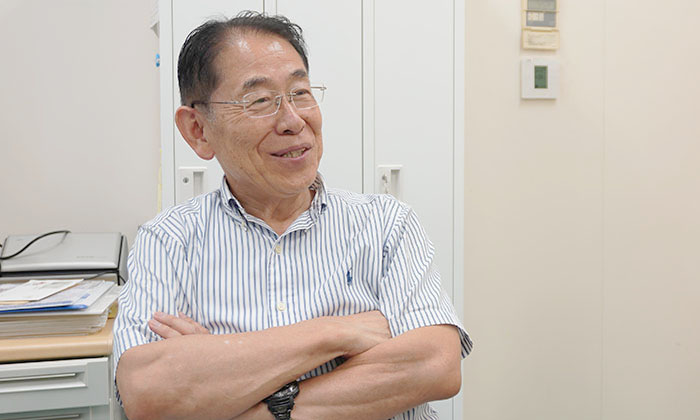
I started preparing about a year before I retired. Actually, my daughter attended a seminar on entrepreneurship on behalf of me, who was very busy, and that is how I met the people at Kyoto-iCAP. At the time, I didn't even know what venture capital was. That was the beginning of a relationship that led to various support for my company's establishment.
I wondered what he had done (laughs). I was a classmate of Mr. Umeda's in the same laboratory when we were both doctoral students at the University of Tokyo. I had been studying the functions of lipids at RIKEN and the Institut National de Recherche et de Médecine de France, so I thought I might be able to help in the area of fish oils, so I joined him.
Fish meat is muscle. The taste of fish changes depending on how the fat is attached to the muscle, doesn't it? I asked him if he could do something for us because he is skilled in lipid analysis and analysis technology at the molecular level.
We believe that in the future, 50 years from now, the functions of various organisms will be the basis for new industries. We named our company "Holobio (all living things)" in the sense that we aim to create innovative technologies through the discovery and elucidation of new functions of living things.
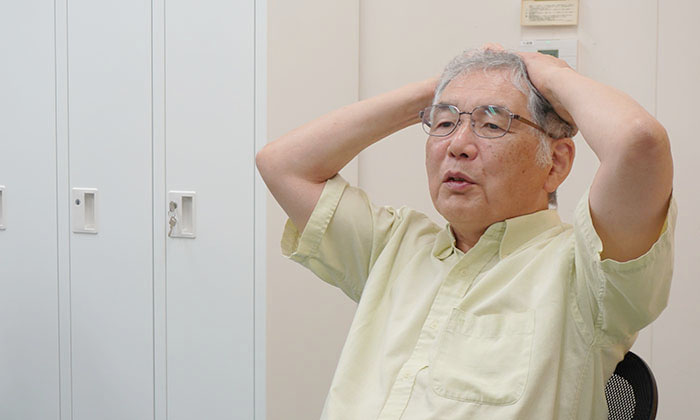
In Japan, a wide variety of fish are farmed, including yellowtail, yellowtail, horse mackerel, and kanpachi. However, it is very important to control water temperature, water quality, and feed. I was also surprised to learn that it is so difficult that sometimes all the fish in the kesu are wiped out without a second thought.
We looked at the intestinal bacteria in farmed fish and found that they were very poor. It is known that the diversity of intestinal bacteria is important for maintaining human health, and the same is true for fish. If the intestinal bacteria environment is poor, the fish cannot take in nutrients effectively, resulting in low survival and growth rates. That is why we determine the best intestinal environment for each type of fish and feed them an intestinal bacteria cocktail, a blend of several types of bacteria, along with feed at the juvenile stage. This improves the intestinal bacteria environment and allows the fish to grow large and healthy. We have applied for a patent for this new aquaculture technology by modifying the intestinal bacteria. In an experiment with rainbow trout fry, those fed the functional intestinal bacteria grew 1.3 times larger than those not fed, and resistance to infection and immune function were improved.
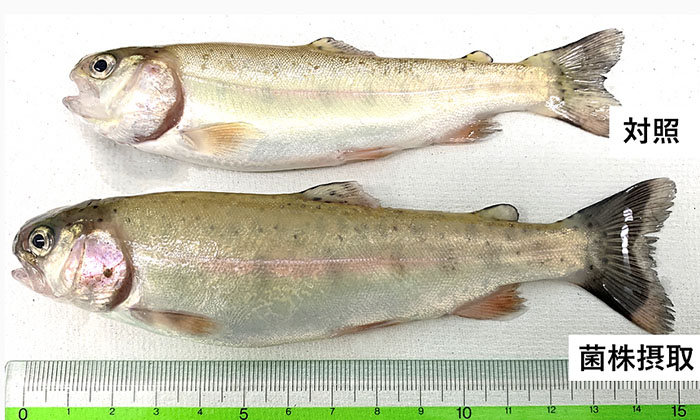
At first, I wasn't taken very seriously wherever I went.
It seems that feeding bacteria to fish as bait has been done before. However, we change the intestinal environment by feeding bacteria. That is what is completely different from conventional methods.
Some people showed interest when we persistently explained the product to them, and while having them use it on site, we are studying the effects on the fish, such as changes in their intestinal bacteria and the degree of growth.
Last summer, a company conducted a test in kampachi aquaculture and found that the fish in the fish tanks that were not fed the functional intestinal bacteria died, but those that were fed the bacteria grew well. We are continuing experiments with a major aquaculture company on other fish as well.
Our goal is to create a branded fish, Sustenaburi®, that is centrally managed from production to shipping. We will utilize functional intestinal bacteria groups for aquaculture, while the landing, processing, and transportation parts will be managed through scientific analysis of the professional know-how we have accumulated. We believe that this will enable us to produce high-quality, delicious fish with a low environmental impact.
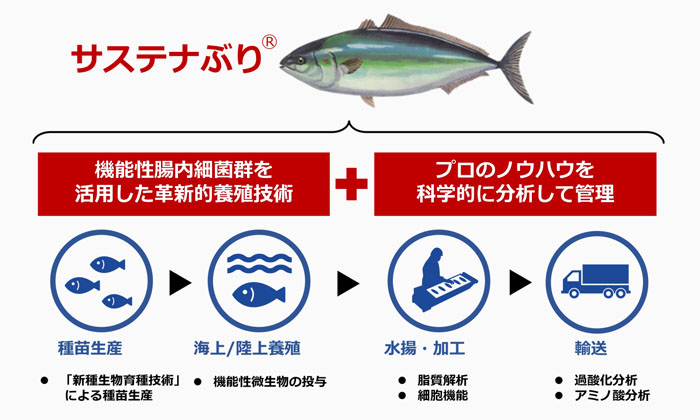
There are many things we don't know yet, but the fat content will change. We need to determine how much fat is enough for people to find it tasty, and it is also important that the fat and meat are distributed in good balance. Naturally, the feed also plays a role, so we are currently accumulating a variety of data. Taste is something that each individual perceives in a different way, so it is difficult to make a blanket statement. We are going to have a chef from a long-established ryotei restaurant in Kyoto cooperate with us and listen to his opinions as we decide on the direction we want to take.
We have also discovered a functional intestinal bacterium that aids in the digestion of plant fiber. Since the price of fishmeal, the main feed for farmed fish, has skyrocketed, we would like to take on the challenge of producing individuals that can efficiently absorb plant-based feed and grow faster. I believe that food production through aquaculture fisheries will expand further in the future as a powerful means of securing protein for mankind, and I would like to make a significant contribution with our technology.
Many researchers want to continue their research even after retirement. We have senior researchers as well, and I believe that the knowledge and experience they have accumulated over the years can be used in various areas of society. It would be great if we could support them in deciding whether their research can become a business or not, or in creating a company. If the research is in the field of biology, we use the same equipment, such as microscopes and analytical instruments, so it would be possible to have the researcher share our equipment and, if the research goes well, spin out the company. When we have a little more time, we would like to do that as well.
I have the pleasure of thinking of new things every day. The biggest difference from my time as a researcher is that I have clients. Researchers tackle unsolvable problems, but managers have the clear step of solving problems one by one. I am glad that I was able to create a place where I can apply the knowledge and research I have cultivated so far in a new field.
It's still nice to be able to do what you love. There will be times when things don't go well, but I guess it's important not to be discouraged at those times.
(Interviewed in July 2024. Affiliations, positions, etc. as of the time of the interview)
After retiring from Kyoto University, Dr. Umeda took a leap of faith and started his own business. We, Kyoto-iCAP, sympathize with his challenging spirit as a second career, and have been working with him since 2022. I am very excited to see how he is cutting into familiar food issues from a new scientific perspective. I hope that holobio will be the catalyst to revitalize the fisheries industry.
Satoru Morita

Holo bio Co., Ltd. Website
Please feel free to contact us if you have any questions or concerns.
Inquiry Form